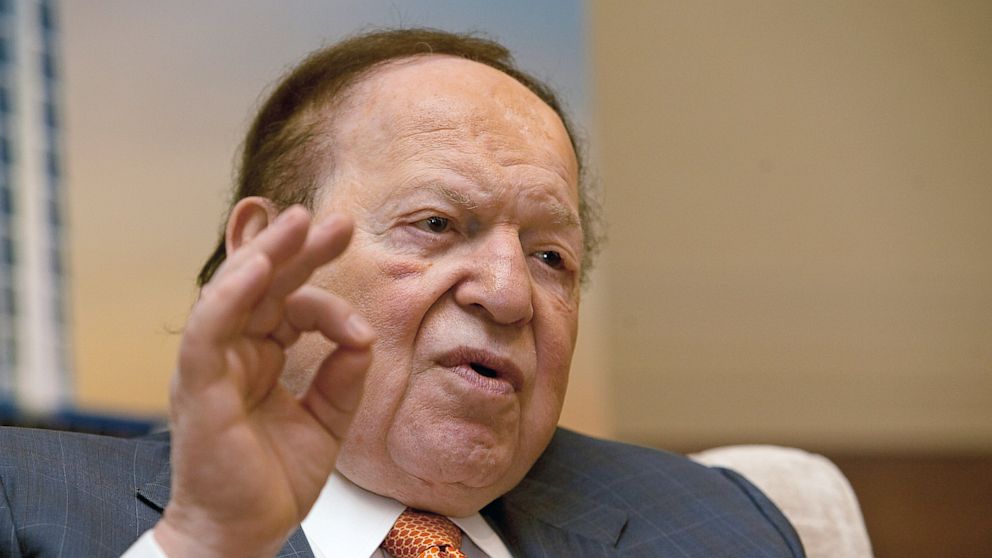Poker Players, Outraged, Target CEO Adelson Over Internet Gaming Stand
Sands CEO's opposition to online gambling earns him threat of boycott.

June 25, 2013 -- Online gambling isn't just bad, it's dangerous and immoral: So argues Sheldon Adelson, CEO of the biggest gaming company in the world.
"Click your mouse and lose your house," warns Adelson, Chairman and CEO of the Las Vegas Sands Corp.
His views, expressed in an op-ed for Forbes, have not endeared him to fans of online poker, thousands of who now are trying to organize a boycott of the sumptuous poker room (59 tables, 14,000-sq. ft.) of Adelson's The Venetian casino and resort.
"As an industry leader, and more importantly as a father, grandfather, citizen and patriot of this great country," writes Adelson in his op-ed, "I am adamantly opposed to the legalization and proliferation of online gaming."
He wags a warning finger at legislation now pending in California and Pennsylvania that would make online gambling legal in those populous states. Gambling online is already legal in Nevada, New Jersey and Delaware.
"You would think," he writes, "[that] the chairman of the world's largest gaming company would pursue any aspect of gaming which could increase profits, right? Ordinarily that is true—but online gambling is 'fool's gold.'"
It's fool's gold, he claims, because its profits have come only at the expense of brick-and-mortar casinos, with a corresponding loss of jobs. Alluding to "recent research from a number of European countries," without identifying that research further, he says that countries in Europe that have legalized online gambling have seen a 20 percent decrease in visitation to land-based casinos.
In the U.S., he predicts, the spread of online gaming will cost "400,000 lost jobs in casino-hosting cities across America"—200,000 jobs directly related to the gaming industry plus another 200,000 indirectly related.
His own business, he says, would not suffer, since the Sands gets "almost all" its casino profits from Asia. Rather, the blow would fall on domestic casinos, including those run by Native Americans.
Online gaming's potential pernicious effects on children, teenagers and adults with gambling problems constitute, in his view, "a societal train wreck waiting to happen."
For example, "The possibility of underage children finding ways to place online wagers and the possibility of people betting under the influence of drugs or being coerced are all scenarios that can happen when the person is only monitored by their own computer screen. On the other hand, when a person makes an effort to get dressed, join some friends and head to the local casino for a night of entertainment, they must show themselves as adults, and their behavior can be observed and ultimately managed by security and other staff if needed."
Martin D. Owens, a California attorney specializing in the law of Internet and interactive gaming (and co-author of "Internet Gaming Law" with Professor Nelson Rose of Whittier Law School) calls Adelson's worries and objections preposterous.
"Mr. Adelson," he says, "is staging a very belated and unimaginative rear-guard action."
Internet gambling is already here, says Owens: 32 states already sanction it for horse betting. Online gambling worldwide is a $30 billion phenomenon; online poker alone accounts for $15 billion worldwide. Of that total, the U.S. accounts for a little less than half--or about $6 billion.
As for why the Internet gaming boom has been accompanied in Europe by a decrease in casino attendance, Owens sees nothing more pernicious at work than a change in gamblers' demographics: Young people now do everything online, including gamble. If the young aren't streaming into brick and mortar casinos, Owens is not surprised: "Nobody drives an Oldsmobile anymore, either."
Ever since 2005, he says, the Harvard Medical School has been conducting an ongoing study of problem gamblers and the Internet. Unusual for its size and scope, the exercise collected data on some 40,000 individuals. Its conclusion: "The overwhelming majority of online gamers play in a very moderate manner, spending minimal amounts on gaming."
Owens says the study found that people at risk of becoming addicted to gambling make up less than 2 percent of the population--a figure confirmed, he says, by a separate State of California study. Says Owens of online gambling: "It's not the looming menace it's made out to be."
John Pappas, president of the 1-million-member-plus Poker Players Alliance calls Adelson's worries baseless.
"I think he's missed the mark by a wide margin," says Pappas. "The reality is that licensed and regulated internet poker is taking place worldwide and right here in America and right here in his [Adelson's] back yard of Nevada. All of the perceived evils have been addressed through appropriate oversight—greater oversight and regulation than what's available in a brick-and-mortar setting. Age-verification? Protecting problem gamblers? Those can be addressed on the Internet even better than in one of Mr. Adelson's casinos." The fact that every action by every player online is tracked in real time he calls "a regulator's dream."




